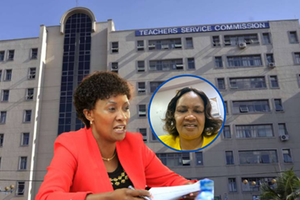
A lack of promotions has left a bitter taste in the mouths of many, frustrated and demoralised by a system they feel has failed them.
For many teachers, being employed by the Teachers Service Commission (TSC) has always been considered a noble calling to shape young minds. But this is slowly turning into a painful struggle for survival for hundreds of teachers.
Despite investing heavily in furthering their education, applying for promotions multiple times, and being shortlisted for interviews, thousands remain stuck in the same grade for years — watching helplessly as younger, less experienced colleagues leap ahead of them. It is a reality that has left a bitter taste in the mouths of many, frustrated and demoralised by a system they feel has failed them.
The lowest level is B5 and the highest is D5, according to the TSC grades and titles. Grade B5 is the primary school entry level into the teaching service, followed by C1 (primary teacher I), C2 (senior teacher II), C3 (senior teacher I), C4 (deputy head teacher II) and C5 (head teacher). Then depending on seniority for the school heads there is D1 (senior head teacher), D2 (deputy principal II), D3 (principal), D4 (senior principal), D5 (chief principal).
Simon Karanja, a job group C2 teacher in Nakuru, knows this pain all too well highlighting it has been a career of regret and resentment. With retirement looming in just a year, he reflects on his journey in the service with little to smile about.
“I’ve stagnated at the P1 level for 27 years, despite attending several interviews, only to receive regret after regret,” he recounts. “It was only after writing to the Office of the Ombudsman, the Speaker of the National Assembly, the Attorney-General, even the President, that something moved. The Ombudsman responded, and soon after, I was promoted. But the damage was done.”
Now in his third year at Job Group C2, Karanja says he has lost all faith in fair play within the TSC, convinced that many promotions are politically influenced.
“If you’re not from the right ethnic group or don’t have money to grease the process, you’re ignored. Even worse, speaking out often invites disciplinary measures,” he says, citing that he was once wrongly accused of absconding duty, and even though he provided evidence to the disciplinary committee against the claim, his salary was still docked.
His sentiments are echoed by many others across the country.
Dismus Omollo, a deputy head teacher at Kayole Primary School, has been stuck in job group C4 for 19 years (since 2006) despite applying for promotions three times. His plight is that of being overlooked and overburdened. “I have watched juniors become my bosses, a very disheartening state of affairs which I must say affects how we perform,” he says.
Having joined the service in 1989, Omollo is preparing for retirement next year. His dreams of advancing in the career long buried, with a current take-home pay of Sh30,000 that is barely enough after deductions. “With government levies and family responsibilities, educating my three daughters is a struggle. I just want to go back to the village and run a small business,” he says.
For Berline Langat, a C1 teacher in Nairobi who has stagnated at the same level since 2014 (11 years), it is the sacrificed family time that stings the most. “I’ve travelled from my rural home to attend interviews during holidays, leaving my family behind, and still, nothing. I have qualifications in another field and, given a chance, I would switch careers in the blink of an eye,” she confesses.
Marking books for 80 pupils daily within a 35-minute lesson period has taken a toll on her physically and emotionally. “Let TSC at least recognise those who’ve tried to upgrade and attended interviews,” she says.
For Florence Wanjiru, who has stagnated at C2 since 2015 (10 years), teaching has been a profession of sacrifice without reward, having attended promotion interviews three times with no success.
“Our classes are packed—up to 90 learners per class, which totals 300 children for the three streams for just one teacher,” she says. “You can imagine marking the books of all these learners within a short time. Clearly we are stretched beyond limits, and without motivation, how do we give our best?”
Lenah Chebet, a teacher in Bomet, shares similar frustrations. “I joined the service in 2010, stagnated at B5 until 2020 (10 years), when through mass promotion in the service I was elevated to C1 where I have remained stuck to date,” she says.
She adds that despite upgrading her education to a diploma and later to degree level, she has been overlooked, which makes her suspect age plays a role as the TSC appears to be prioritising teachers above the age of 55. Ms Chebet is 40 years old and believes that even those in their mid-careers deserve fair consideration.
Similarly, Erastus Karanja, a B5 teacher for a decade now, remains stuck at the lowest grade, which is the entry level in the teaching profession in Kenya.
Despite applying three times, he has never received a response, and in the last attempt, his application did not even go through due to ‘a technical hitch on the system’.
“It’s heartbreaking to watch others promoted while I remain stagnant,” he says. “Yet I still teach classes of over 80 junior school learners. What keeps me going is knowing those children need us.”
Gerald Mutua has been a C1 teacher since 2017 and feels disappointed at being overlooked for promotion, particularly as some teachers hired in 2018 have already overtaken him.
“I’ve been overlooked in three cycles, the last one in January this year. I qualify, yet I’m ignored,” he says. “Sometimes I feel like quitting, but I have four children who I must fend for during these hard economic times. Still, working with 70 to 100 pupils per class without recognition breaks your spirit.”
TSC’s own submission to Parliament in May this year confirmed what many teachers have long suspected, that promotions are being bottlenecked by budgetary constraints.
Of the 25,252 teachers identified for promotion in the latest cycle, only 23,388 were cleared, meaning that some 1,864 teachers who passed interviews were dropped due to lack of funds.
Lawmakers have since flagged the current promotion criteria as flawed, citing unfair advantage for some while locking out others who meet the qualifications. TSC has always maintained that it has established a standardised scoring system to objectively assess candidates during promotion interviews to ensure they are based on merit.
Many teachers, like Judy Mwema, took loans to further their studies, hoping that promotions would follow. Eleven years and 14 regret letters later, she remains in C1, buried in debt.
“Frankly speaking, it is the passion for teaching that keeps me going,” she says. “But truthfully, side hustles are what sustain us now. I know colleagues who rely on vegetable kiosks or home tutoring to survive.”
Ms Mwema, a teacher in Nairobi, is convinced that reverting to the old Schemes of Service would be fairer. “The current Career Progression Guidelines (CPG) have locked out many deserving teachers.”
The CPG outlines the academic and professional criteria for a teacher’s career advancement, linking progression to his/her performance and professional conduct. The Schemes of Service, which was officially replaced by the CPG in 2018, was a structured, qualification-based framework that emphasised academic achievement, years of service, and professional development as the basis for promotion.
The ripple effects of stagnation go beyond personal disappointment. Teachers report reduced morale, burnout, and a sense of betrayal—conditions that directly impact learning outcomes.
The TSC’s Teacher Wellness Office, meant to support struggling teachers, has been accused of turning into what some like Karanja call a “slaughterhouse”—used to push out vocal teachers under claims of psychiatric issues. “They use mental health claims to retire teachers who speak up and I have been through that, so I know,” he says.
While thousands of teachers continue to show up daily, battling overcrowded classrooms and emotional fatigue, their cries for fairness, recognition and dignity in the workplace grow louder.
The stories of Simon, Dismus, Gerald, Florence, and many others are not isolated and are reflections of a systemic problem — a flawed and underfunded promotion mechanism that stifles ambition, ignores merit, and rewards connections over competence.







